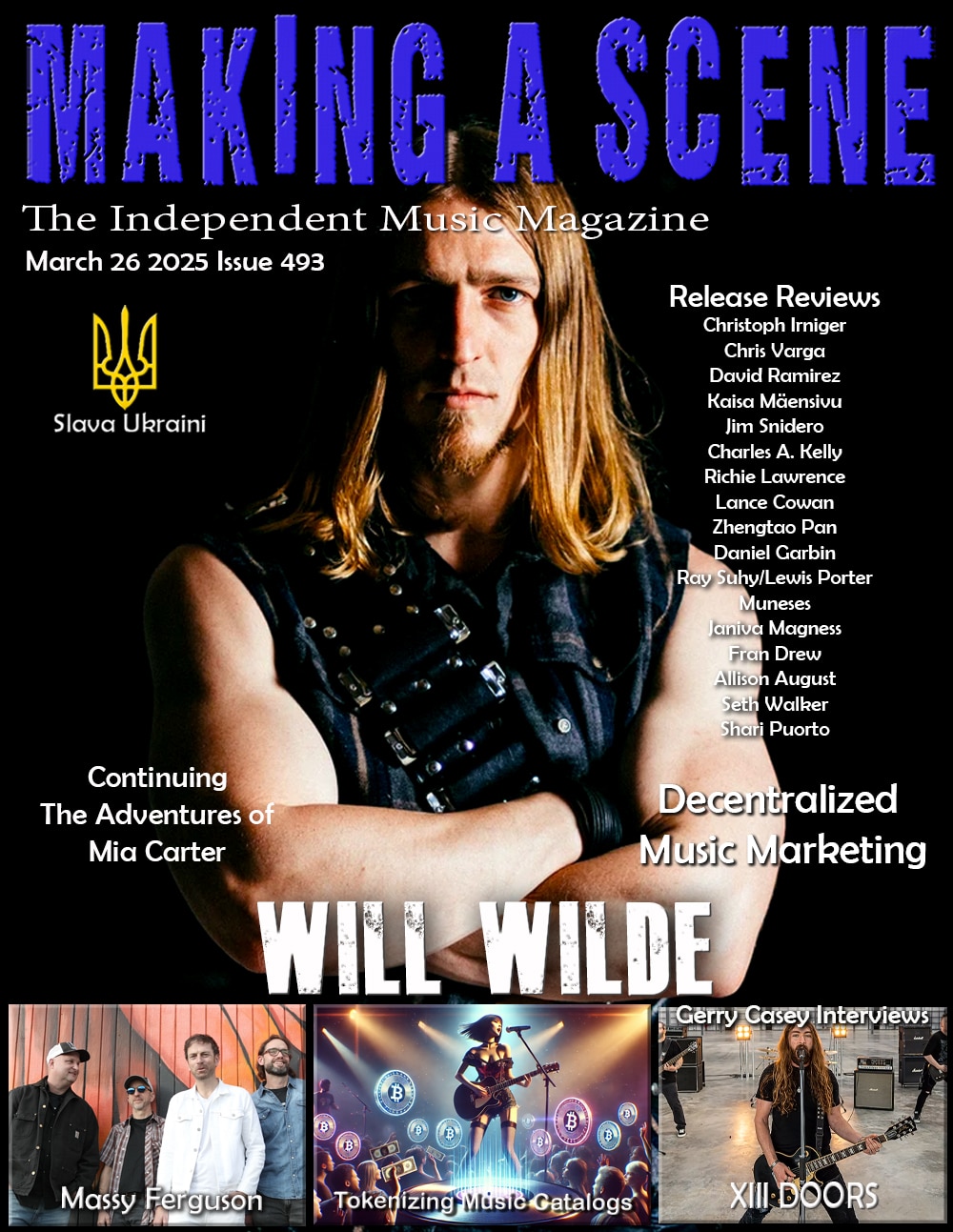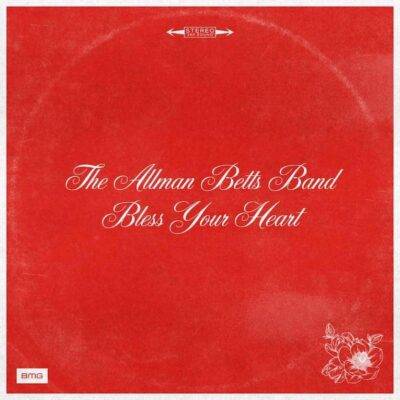Allman-Betts Band Bless Your Heart
Allman-Betts Band
Bless Your Heart
BMG
Last year’s debut from the Allman-Betts Band, Down to the River, marked the first time the seven-piece ensemble played together, let alone record together. But even that is not entirely accurate as keyboardist John Ginty joined the band for the tour, after the recording was done. So, if that marked a let’s-put-our-feet-in-the-water effort, this one, Bless Your Heart is an expansive double-CD that shows the full breath of the band’s talents, representing songwriting from the three next generation sons – Devon Allman, Duane Betts, and Berry Oakley Jr.
To further understand the blueprint for the album, here’s a passage taken from my interview with Devon Allman and Duane Betts last year about their touring repertoire – “We draw from four buckets: our record, tipping our hats to our dads, mine and Duane’s solo material, and our own heroes. When asked about dealing with rowdy requests, Devon said, “I don’t mind it, I know how to deal with it; we have fun with it. Sometimes we may even respond with, ‘We ain’t a damn jukebox.” When and if touring resumes, they will have plenty of material to draw from now, given these 13 tracks, several, like their forbears, epic in length. And, although there are the expected echoes of those forbears here, they play a relatively minor role as the band is clearly fashioning its own sound.
Over a week’s time, they recorded 13 songs at the legendary Muscle Shoals Sound Studio on 2-inch tape, just as they did with Down to The River. They again also enlisted Matt Ross-Spang as producer and Stoll Vaughan as co-writer with Allman and Betts for most of the songs. In addition to the time in Muscle Shoals, Bless Your Heart saw additional tracking in Memphis and St. Louis. Within the eclectic repertoire are the familiar: three guitarists (Allman, Betts, Johnny Stachela); electric, acoustic, and slide; R. Scott Bryan and John Lum driving a throttling, percussive rhythm section. And the fresh: Bassist and singer Berry Duane Oakley’s ABB vocal debut on his original song (“The Doctor’s Daughter”); Allman’s baritone vocal channeling Johnny Cash (“Much Obliged”); Betts extending the legendary family legacy of incendiary instrumentals (“Savannah’s Dream”), and John Ginty behind the keyboards on all tracks. They tapped friends, as well, such as Jimmy Hall, Shannon McNally, Art Edmaiston (Bo-Keys), Susan Marshall, and Reba Russell for guest contributions.
Interestingly, they begin with “Pale Horse Rider,” the single and accompanying video, with the title inevitably evoking Devon’s dad’s iconic tune, Yet, this is different. It opens ominously, quickly evolving into a dense coagulation, accentuated by Allman’s ghostly wordless chorus and a thunderous, expansive outro. The wild buzz of guitars centers on a Duane Betts riff evoking the spirit of Neil Young’s Crazy Horse and modern counterpart, My Morning Jacket. Not only does it portend an album of exploration, but its density can be a bit disarming, cacophonous rather than clean. Where Crazy Horse is ragged, the ABB is often just dense, leaving the listener wanting some paring back in places.
“Carolina Song,” imbued by Johnny Stachela’s slide and harmonies from Marshall and Russell follows. Allman then hands the baton to Betts for the Memphis boogie “King Crawler, nodding to the Stones and featuring Edmaiston on sax, with a sound not unlike the Stones, Exile on Main Street vintage. Betts follows with his co-wrote with Vaughan, “Ashes of My Lovers,” a semi-autobiographical motif of romance and wreckage. Wet Willie’s iconic Jimmy Hall guests, adding his signature harmonica to the cinematic Badlands spook, while singer Shannon McNally counters Betts with an aching vocal on the way out. Hall called the track, “like the Stones in Morocco.”
The epic instrumental “Savannah’s Dream” is right out of the Allman Brothers Band playbook, as a “nephew” of “High Falls.” Solos come from Allman, Stachela, and Ginty, preceding Betts’ extended workout. Southern lore continues with “Airboats and Cocaine,” a tongue-in-cheek Southern Gothic tale of a girl born into the wrong family and her guy regretting his incidental associations with the underbelly of swampland contraband. Loosely rendered, this one features barrelhouse piano from Ginty and slide from Stachela while Allman and Betts share the lead vocal simultaneously.
Allman returns for “Southern Rain,” with perhaps his most emotive vocal on the set as he addresses the loss of his parents in song for the first time, offering some comfort to those experiencing that same pain. Betts also turns autobiographical again on “Rivers Run.” There’s much to savor on this drummer less track, a great example of the “paring back” referenced earlier. Ginty plays a restrained Mellotron while Betts and Allman double on acoustic guitars, then Betts and Stachela in an electric twin-guitar harmony nod to Duane’s dad.
“Magnolia Road,” written solely by Vaughan, is sure to become a live staple. It’s also semi-autobiographical, with Allman and Betts trading vocals by verse and exceptionally strong guitar and keyboard work, making it a standout track that the band claims was inspired by their affection for The Band and The Grateful Dead. The follow with another killer guitar track featuring Betts and Stachela, “Should We Ever Part,” with a nod to New Orleans and specifically the Dr. John album, Locked Down.
“The Doctor’s Daughter” is the debut of a Berry Oakley Jr. as a vocalist who shares writing credits with the usual trio. Oakley sings and plays piano on this ethereal track, joining the spacey vibe of vintage Pink Floyd with Betts’ exotic, Spanish-style acoustic guitar work and Stachela’s unspooling slide. “Much Obliged” also offers something unpredictably different. Allman’s jolting baritone vocal started playfully as a wink to Johnny Cash, but following its one-take magic, was deemed a respectful keeper and the band’s first entry into the Cowboy song canon. They close in “pared back” fashion with “Congratulations,” a last-minute song submission from L.A. musician, producer, and songwriter Cisco Adler. It’s rendered as a tasteful piano/vocal duet that has Allman singing in a quieter style, reminiscing about leaving home and leaving everything behind, mirroring his life as a teen- leaving Texas to go on the road, traveling with The Allman Brothers Band on their 1989 reunion tour.
While there are plenty of instrumental licks to admire, the Allman-Betts Band is focused more on the songs than showcasing their instrumental prowess, differentiating them from their dads. While it’s a daring mix and representative of the tough challenge they face carrying on that legacy, there are several gems here. Dig in.
- Jim Hynes
Discover more from Making A Scene!
Subscribe to get the latest posts sent to your email.















































